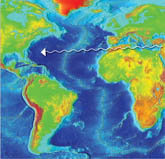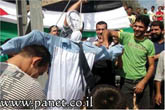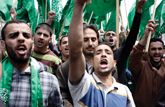

{image_1}Israel’s Home Front Command developed several items to help civilians living under the threat of rocket fire in addition to safe rooms. The Command recently completed the carefully tested items in the face of conventional threats.
Continue Reading »
{image_1}Hatred of Israel reaches new levels in Ireland: A couple of months ago, an outrageous anti-Israel display was held on Dublin's main pedestrian street, presenting IDF [Israel Defense Forces] soldiers as Nazi troops. As part of the display, sponsored by the Dublin City Council, a group of pro-Palestinian activists set up a model of the separation fence [along the West Bank border] and an IDF roadblock. The activists dressed up as soldiers and beat, humiliated, and pointed their weapons at other activists dressed as Palestinians in front of thousands of Irish citizens and tourists.
Continue Reading »
{image_1}After the kosher slaughter ban, the circumcision ritual is in danger too. European rabbis and senior Jewish officials have been acting in recent months against an initiative to ban circumcision in three countries. Rabbi Menachem Gelley of London, vice president of the Conference of European Rabbis, revealed the issue during the organization's 27th annual convention held in Warsaw Poland in November, which dealt with ways to protect Jewish rights in the continent.
Continue Reading »
{image_1}With ongoing tensions with the United States and Iran over the latter’s nuclear program in the background, Tehran announced [in October] the intention to send a naval presence near US territory. According to the Iranian Fars News Agency, Iranian Navy Commander Rear Admiral Habibollah Sayyari was quoted as saying, “Like the arrogant powers that are present near our marine borders, we will also have a powerful presence close to the American marine borders.”
Continue Reading »
{image_1}Reports of 20,000 missing shoulder-fired, anti-aircraft rockets in Libya have sent shivers down the spines of many airline security officials, who fear they may find their way into the hands of terrorists. U.S. Senator Barbara Boxer has already called for hundreds of American jetliners to be outfitted with protection from such threats. No such commercially available protection system exists, yet. But an Israeli company has developed the world’s only civilian system that can be mounted on a passenger liner, which detects incoming missiles and—without shooting them down—deflects them with laser technology.
Continue Reading »
{image_1}Palestinian Authority [PA] TV broadcast a news story about the trial and symbolic hanging of Israeli PM Benjamin Netanyahu, which took place during an event organized by Fatah for youth in the West Bank [Judea and Samaria]. The symbolic trial tried and convicted Netanyahu of “war crimes against humanity” and sentenced him to death by hanging.
Continue Reading »
{image_1}On July 10th, Israel ratified an agreement with Cyprus which sets Israel's maritime borders. Lebanon has rejected the borders set by the two countries, claiming the state [Israel] is impinging on its naval territory, but [Israel] Foreign Minister Avigdor Lieberman said Israel would not cede “one centimeter.” Lieberman also denied reports that the United States supports Lebanon's claims, calling them “nonsense.”
Continue Reading »
{image_1}World leaders speak about the need for a two-state solution for the Israeli–Palestinian conflict, frequently using the catch phrase “two states for two peoples.” Surprisingly, voices have been raised recently calling for a one-state solution. Yoram Ettinger, a former consul-general of the Israeli Consulate in Houston in the United States and now the CEO of “Second Thought: A US–Israel Initiative” spoke to Bridges for Peace about his ideas.
Continue Reading »
{image_1} Iran said it has successfully tested a new ballistic missile that is harder to detect and will now start mass-producing them. The missile, called Qiyam, is reportedly designed without stabilizer fins and was delivered to the aerospace wing of the Revolutionary Guards. Iran’s state television, Al-Alam, said the surface-to-surface missile was a pure Iranian project. The missile’s range wasn’t disclosed, but experts believe it is similar to Russian-designed Scud rockets, which can reach several-hundred kilometers. They make up the core of Syria’s arsenal, and reports said the new Iranian missile could find its way to Hizbullah in Lebanon.
Continue Reading »
{image_1} The Muslim Brotherhood has announced it will create a political party to vie in Egypt’s September parliamentary elections. The party, which will call itself the Freedom and Justice Party, will officially be independent from the Brotherhood but “will coordinate with it” according to a spokesman for the group. The distinction appears to be nothing more than a legal technicality. Since the downfall of Hosni Mubarak became inevitable, observers have wondered openly whether the new political situation in Egypt would open the door to Islamist organizations such as the Muslim Brotherhood.
Continue Reading »All logos and trademarks in this site are property of their respective owner. All other materials are property of Bridges for Peace. Copyright © 2025.
Website Site Design by J-Town Internet Services Ltd. - Based in Jerusalem and Serving the World.